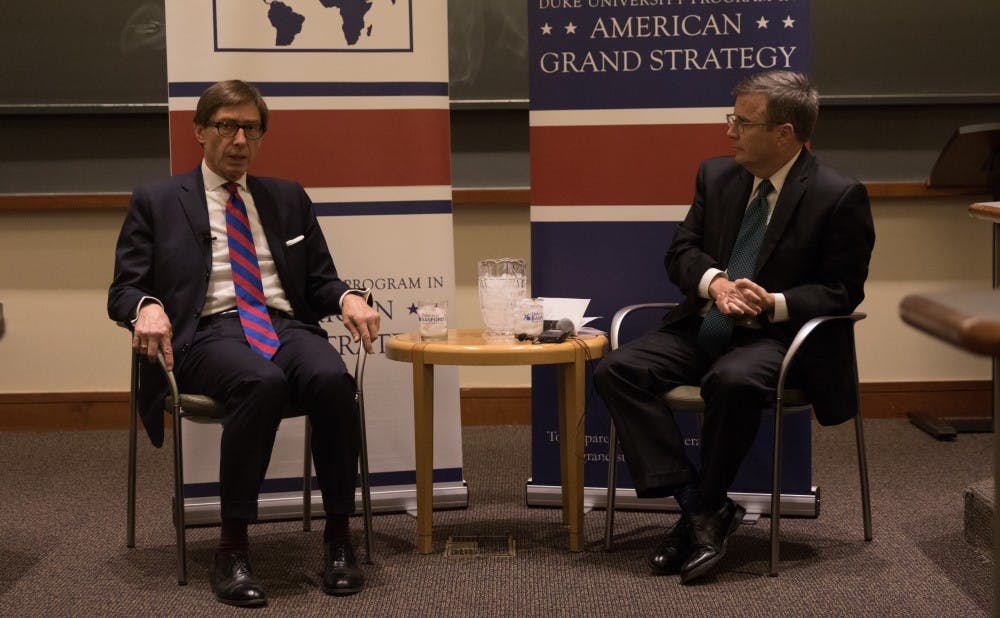Despite recent shifts in both international affairs and its own domestic politics, Germany has never relented its pursuit of stability and unity on both a regional and global scale, the German Ambassador to the United States said at an event Tuesday.
“The biggest challenge in [German] Chancellor [Angela] Merkel’s next term is not a German one, but an European one,” Ambassador Peter Wittig said. “It’s Germany’s responsibility to help maintain stability and prosperity of the European Union and bring new life into the European situations.”
Although Chancellor Merkel recently failed to form a coalition government, Wittig noted that he is confident a grand coalition of the right and left wings will take place shortly.
“Chancellor Merkel has always been underestimated,” he said. “It may take time before she establishes a coalition government, but it is highly unlikely for a re-election to happen.”
Populist sentiment has surged in Germany, like in many other Western countries such as the United States and the United Kingdom, Wittig said. Alternative for Germany, a right-wing anti-immigration party, has won over 12 percent of the vote in the December election and entered the German Parliament for the first time.
“I would not call this rise of populism a crisis, but it is certainly a challenge for Western democracies,” Wittig said. “And it would take us some time before we win back the people who are frustrated.”
Wittig added that Germany has taken measures to mitigate workers’ concerns of becoming the losers of globalization. For example, the Parliament has managed to establish political discourse to address the appeals from the Social Democratic Party, which is comprised mostly of traditional German workers. It has also launched retraining and re-education programs to equip workers with practical skills in line with technological advancement.
Germany’s measures to cope with challenges caused by globalization would be applicable on the global scale too, Wittig noted. He added that he believes the key is to enable workers to be more flexible and resilient, while maintaining the order of the free market.
These challenges from globalization manifest in the transatlantic relationship with the United States. Germany feels insecure about the message President Trump sends since he came into office, especially his "American First" slogan, Wittig said.
“The United States has been a world leader not only by virtue of its size and strength but, more importantly, by the value its shares with the other Western democracies,” he said.
Wittig added that there is concern President Trump believes the United States’ global leadership and alliances with other countries are less important than its own interests. This message adds to the insecurity of Germany and other Western countries.
The Brexit and the election of President Trump served as a wake-up call for the European Union to self-reform and find a new common purpose for the entire community, he noted.
“The European Union is more than an economic club,” Wittig said, “It’s responsible to provide peace, stability and prosperity and prevent re-emergence of violent conflict over the whole continent.”
With Brexit, Germany intends to maintain its close economic and political partnership with the United Kingdom, although it will ensure the UK does not enjoy the privileges, nor shoulder the responsibilities as an EU member.
“Brexit is not cherry-picking,” Wittig said. “For the UK to remain in the single market [of EU], it cannot only embrace the free flow of goods and services but not that of people.”
Anti-immigration sentiment was one of the factors that fueled Brexit, attitudes which Germany has also recently experienced.
This pattern in Germany is largely due to a cultural shock, Wittig said, since Germany has offered refuge to a large number of people from Syria, Iraq and Afghanistan, predominantly Muslim countries.
“Some parts of Europe—especially Eastern Europe—is relatively homogeneous in its composition,” Wittig said. “Immigration of Muslims [into Europe] is more difficult than the immigration of Mexicans or Hondurans into the Untied States.”
Wittig also emphasized Germany's role in defense. Through some of Germany's efforts, the European Union has managed to increase its self-defense capability by constructing its own defense system, separate from the North Atlantic Treaty Organization, he noted.
“Europe needs to be more forward looking in our military posture,” Wittig said. “But this self-defense system will still be complementary to NATO, not be in conflict with it.”
Germany and other European countries have also increased their investment in renewable energy, especially solar power, Wittig added. These countries hope this approach will help them mitigate potential energy crises.
Junior Sam June said she attended the event because she was interested in German culture and politics. She has taken three German culture courses at Duke.
She added that she was especially amazed at Germany’s dedicated promotion of solar power usage. For June, Germany has set an extraordinary example for other countries such as the United States to follow their lead.
“There is much more the United States can do [in promoting renewable energy],” she said. “Especially since we clearly have the variability and capability to do so.”
Get The Chronicle straight to your inbox
Signup for our weekly newsletter. Cancel at any time.

